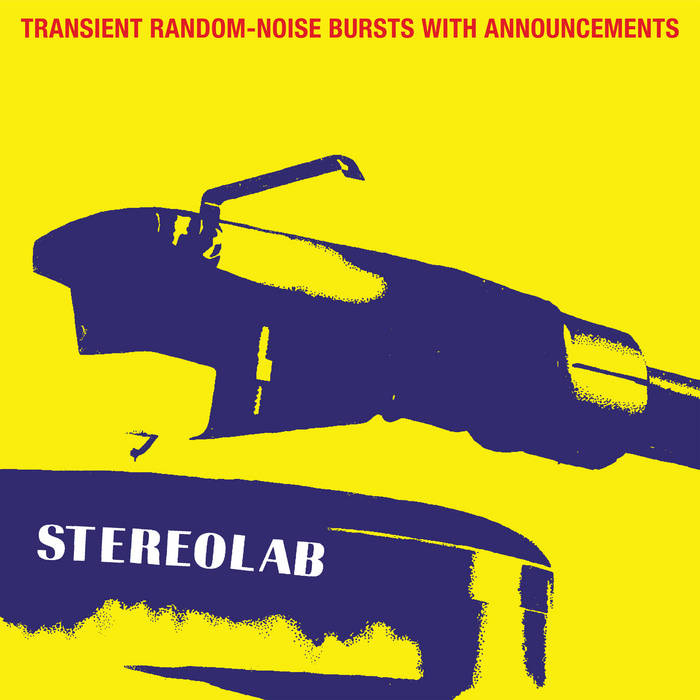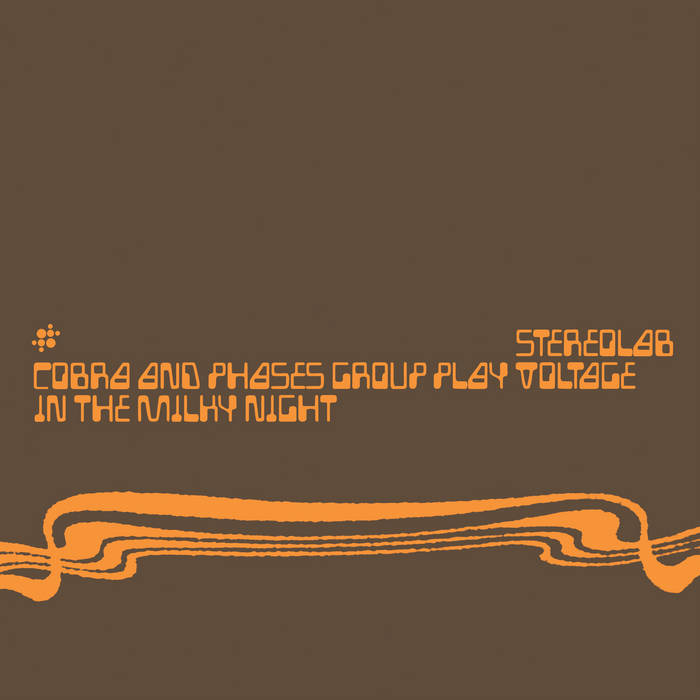A few days ago Stereolab released Instant Holograms on Metal Film, their first album of new material in 15 years. I’m happy to report that it’s the best record they’ve made since 2001. To celebrate the return of one of my all-time favorite artists, I’ve compiled all my best writing about Stereolab over the years along with my playlist STEREOLAB CLASSICS, which I believe is the best and most accessible introduction to the groop’s full body of work – including a few of the new songs – that you’ll find anywhere.
[Spotify | Apple Music]
The Numbing Is Not Working Anymore
Stereolab “Aerial Troubles”
Stereolab has returned after 15 years without releasing new material. “Aerial Troubles” sounds exactly like Stereolab in all the ways I expect you to immediately understand, because actually describing their aesthetic feels a little like trying to describe a color. (You’ve seen yellow, right? It looks like things that are yellow.)
But it’s also very Stereolab in the sense that they’ve always taken the “lab” part of their name seriously. They’re always tweaking the formula, absorbing different styles, and figuring out new ways to sound like themselves. In this case, it’s a very different approach to three-part harmony. (I think they’re pulling from Eastern European tradition here, but this beyond my expertise.) There’s also a cool melodic riff towards the end that strikes me as very un-Stereolab, but its fits seamlessly into this composition so it ends up being one more vibe assimilated by the groop.
The lyrics are Stereolab to the nth degree. Laetitia Sadier is singing about “dying modernity” and consumerism no longer serving as an effective numbing agent, but as always, she has some optimism about the possibilities of life on the other side of capitalism and imperialism. She’s using a lot of clunky academic language – “the juncture invites us to provide care while offering antenatal care for the inception of the new yet-undefined future” – but somehow she makes it sound so smooth and elegant in her melodies.
Buy it from Bandcamp.
Untie The Tangles
Stereolab “Metronomic Underground”
When Stereolab perform “Metronomic Underground” now, Laetitia Sadier introduces it as music for “meditation.” I’d never thought of the song in that way before, but when I consider how I’ve engaged with it through the past few decades, I somehow instinctively understood this intention. It’s a song I’ve always gravitated to when I need to find a center, or a feeling of peace and harmony in a hectic world. I’ve always heard the music as being specifically urban, like a musical depiction of a city observed from a distance, people and cars and trains moving to a hidden groove.
This is one of my favorite pieces of music. If I had to make a list of my top songs through my life, it’d probably be top 10. I can never understate how much I love this song, and its bass groove in particular. The arrangement feels geometric to me, like shapes moving and aligning around that bass in a steady lateral progression. There is a profound sense of balance and precision to the music, but it’s performed with a very human energy. Live versions of the song go faster, and include extended noisy sequences. The version the groop performs in 2019 does both of these things, but also shifts the tempo around – it slows near the end, but it’s a bit of a fake-out as it picks back up before the conclusion. It’s like the music is a perfectly designed map, and the band takes different paths through it every time.
The lyrics for “Metronomic Underground” are essentially evergreen in relationship to a culture with some form of media, but feel particularly prescient about the time we live in now. “Who knows does not speak, who speaks does not know” sums up the state of political media. “Rounding the sharpness, untie the tangles,” a good description of the urge to simplify the complexity of art and human experience in the interest of harsh moral judgment or a refusal to engage with contradiction. “To be infinite, to be vacuous,” a pithy summary of social media. This is all very cynical, but it doesn’t undermine the meditative quality of the music. The critique is abstracted and removed from context in a way that suggests an eternal truth. It’s all something to be understood, a state of human nature. You have to find your peace with it.
9/29/2019
To Keep Our Lives Going
Stereolab “Brakhage”
There are a lot of things happening in “Brakhage” but the center of the song is just two chords, strummed in a steady and relaxing pattern through all the rhythmic and melodic changes. As with “Metronomic Underground,” there’s a suggestion of objects moving in an unconscious synchronicity through a physical space. I closely associate the sound of this with commuter trains and hub spaces, moving walkways and airports. The tone isn’t tense or agitated, it’s more a sense of calm and order. It’s turning your mind off and going on autopilot as you navigate your way from point A to point B.
You follow the pulse of Tim Gane’s guitar until there’s finally a deviation of the pattern in a break sequence a little over 4 minutes in, and you get a different two chord pattern for a few seconds before clicking back into the original sequence. There is a feeling of low-key relief in that switch-up, like you’ve just arrived at a destination only to get back to moving through corridors on your way to someplace else.
Laetitia Sadier’s lyrics reinforce the commuter interpretation by repeating a mantra – “we need so damn many things to keep our stupid lives going” – that spells out the motivation of keeping oneself in this loop of passive behavior. The tone isn’t angry or dismissive, just self-aware and clued in to the absurdity of it all. It’s the awareness of how fragile needs make us, and how much we risk by stepping outside of this system.
9/30/2019
Insane Realities To Come
Stereolab “Jenny Ondioline”
Stereolab is now best known for an immaculate, groovy, keyboard-heavy sound, but their breakthrough record Transient Random Noise-Bursts with Announcements only barely hints at that aesthetic in a couple tracks and places all emphasis on Tim Gane’s overdriven guitar riffs, buzzing synths, and Krautrock-derived rhythms. It’s a highly distinctive aesthetic – a maturation of where they started on Peng! and the Switched On singles, but far less lounge-y and refined than where they’d end up only a year later on Mars Audiac Quintet. But whereas the former record is a transitional work on the way to Gane and Laetitia Sadier truly finding their stylistic lane on Emperor Tomato Ketchup, Transient is a fully formed masterpiece. They could have kept iterating on this vibe, but probably understood it was unlikely to top what they had accomplished with it.
The version of “Jenny Ondioline” that appears on Transient is a side-long 18 minute suite which also includes what is separately known as “Exploding Head Movie” on the Refried Ectoplasm compilation. That sequence is essentially a reworked cover of Neu!’s “Hallogallo,” the very definition of what is called the “motorik” aesthetic. The primary part of the song, which is about the first 7 minutes on record but is edited down to under 4 minutes for the single version, is pretty much the pinnacle of the first phase of Stereolab’s career. All of Gane and Sadier’s musical and lyrical concepts culminate in this piece, and in the process, they level up as pure songwriters.
“Jenny Ondioline” is rough and loud but elegantly composed, and bracketed by two power-strummed guitar sequences that work like sonic columns. The main rhythm is mechanical and precise, but has a brightness to it as well, like sparkling light on chrome. The section just before the chorus, in which the music drops back and a “oooooooh” vocal is foregrounded, builds drama but also offers a more sensual sort of beauty. The chorus is probably the best proper chorus of their career – bold, emphatic, and defiant with punk spirit even if the tone is more reasonable and pragmatic. Sadier is bitter but idealistic here, singing about the dire state of encroaching fascism and the disappointments of socialism in action, but with a genuine hope that conditions can be improved. This is a thematic thread that carries on through her work for many years, but it’s rarely stated as clearly and as powerfully as it is here.
10/3/2019
Fragile Defense Of Words
Stereolab “Come and Play in the Milky Night”
“Come and Play in the Milky Night” has a swing to it that sets it apart from Stereolab’s tendency towards more rigid grooves. The song feels light and effervescent, with Tim Gane’s gentle chords playing off Andy Ramsay’s cymbals in a way that evokes light reflecting off water on a summer night. The bass, keyboard, and vocal melodies are just as lovely, and it all comes together as one of the group’s most relaxed and beautiful recordings. It’s strange that this song is something of an outlier in their discography – the feel of it seems very natural for them, or at least for Ramsay. As the catalog progressed, Gane’s compositional style moved mostly towards tighter constructions, to the point that the later works often felt more like listening to structures than songs.
Laetitia Sadier sings at the top of her register here, and given the way her words are clipped by the melody, I didn’t realize for a long time that she was singing in English rather than French. The words just didn’t register at all, and the vocal here feels more atmospheric than central to the composition. The lyrics support the tone of the track, offering up images of stars and the night sky while suggesting a move away from rational thought. It’s like she’s just telling you – “it’s alright, let it all go for now and enjoy this moment.”
10/2/2019
Born With The World
Stereolab “Wow and Flutter”
There is an odd sort of optimism in Laetitia Sadier’s lyrics, in that she consistently acknowledges the worst of the world but also the impermanence of any condition. This is most clearly stated in the mantra of “Crest” from Transient Random Noise-Bursts with Announcements: “If there’s been a way to build it, there’ll be a way to destroy it, things are not all that out of control.” “Wow and Flutter,” a song from the subsequent album Mars Audiac Quintet, expands on this notion and goes beyond aphorism into more specific context. She roots it in personal experience of youth – “I didn’t question, I didn’t know,” “I thought IBM was born with the world, the US flag would float forever” – before embracing hope in the understanding that all things will end.
The faith at the core of “Wow and Flutter” is in that what comes after a grim present is a brighter future, or at least that it’s possible to correct mistakes rather than let them metastasize further. Sadier’s tone is cold and sober, her hopes are not particularly high but there’s a feeling in the music of swelling hope and pride. “Anthemic” isn’t a mode Stereolab worked in often, but it sorta applies to this one, and the way its chorus rises emphatically over a chugging rhythm. The song isn’t promising anything but entropy, but the music is asking you to do your part to help shift the arc of time and history towards something more bearable.
10/1/2019
In Another World, It’d Be Funny
Stereolab “The Noise Of Carpet”
Could this be the greatest tough love song of all time? Even if you’re not exactly the type of smug, lazy person Laetita Sadier is railing against, each lyric stings because on some level you probably feel like maybe you are being implicated, and that you are too bitter, cynical, and apathetic. Part of what makes this work so well is that Sadier is so calm and measured as she sings these stern words, but there’s an obvious tone of disappointment in her voice, like a disapproving parent or authority figure. She makes you feel bad for letting her down, and for not living up to your potential. This is not a dismissive song, it’s not a matter of “Ugh, kids today.” It’s about wanting people to be better, and not giving in to the worst of humanity. She makes it clear that it’s not easy to “apply your leading potential and be useful to this planet,” but it’s worth the effort. After all, as she sings, “the world would give you anything as long as you will want to.”
1/13/2010
Things Are Not All That Out Of Control
Stereolab “Three Women”
Though formal experimentation has been the name of the Stereolab game since day one, much of the band’s work since the death of Mary Hansen has come across as overly sterile and emotionally neutral, even when they were integrating elements of sunshine pop and funky percussion on the Fab Four Suture singles. At some point, Tim Gane and company lost a certain spark of humanity, and even in spite of musical elements that qualified as hooks, the songs were not catchy or pop, but instead icy reiterations of concepts they’d been mining since the late 90s. “Three Women,” from the forthcoming album Chemical Chords, does not break new ground for the groop, but it has a light, unfussy touch and an abundance of emotion that allows its hooks to sink in rather than slip off. In a word, the song sounds inspired, and a result, it’s inspiring. It’s dynamic and groovy and full of lovely melodic bits, and most importantly, it rises up for a gentle, joyous catharsis. In the context of what they’ve been doing for the past several years, the song feels like the first truly happy day after a long stretch of inertia, indecision, and mourning. It’s the moment when the trauma finally seems to be in the past, and you get to feeling like yourself again.
5/1/2008
Some Satisfaction
Stereolab “Two Finger Symphony”
Late period Stereolab is sort of hard to judge. Most anyone would agree that the band has been in a creative decline, but they haven’t become stagnant — there has been a fair amount of experimentation, particularly in the Fab Four Suture period — and their baseline level of quality is admirable. The problem is that few songs from 2003 onward rise far above this baseline level. It’s all very listenable but little of it commands attention beyond noticing some intriguing musical hook that is nonetheless fairly forgettable. You know how food and beverages can be described as having a good “mouthfeel”? Pretty much anything Tim Gane composes will have a good “earfeel.” It’s always going to be a superficially pleasant experience, but you can’t count on the music being resonant or emotionally urgent.
Not Music, the latest and potentially final release by Stereolab, is culled from the same sessions that produced 2008’s Chemical Chords. The albums sound and feel almost identical. Gane’s tracks all have a jaunty, upbeat tone, and are built upon rhythms that draw heavily from ’60s soul. It’s a good twist on the familiar Stereolab sound, but too much of it comes out sounding too sterile and clinical to fully connect. In some cases, it is frustrating to hear so many good ideas in a song that does not totally snap together. Some x factor seems to be missing, but it’s hard to say what that could be. It could be a matter of some necessary tension being absent from the music, or the process that produces the music. In some interviews, Gane has talked about how the character of each Stereolab album is determined by his collaborators. With this in mind, I wonder if the x factor was personified by Mary Hansen, who was a core member of the group through the peak period in the ’90s and died in 2002, just before the band fell into a creative malaise. At the same time, the dissolution of Tim Gane and Laetitia Sadier’s romantic relationship could possibly have something to do with the diminishing returns of their creative partnership. Who knows. It could just be a matter of passion and energy — the best Stereolab music comes from a place of anger and restlessness, some critical perspective on modern society. Their more recent material lacks that kind of intensity.
“Two Finger Symphony” is one of the best songs from the Chemical Chords/Not Music sessions, mainly because it has some sense of urgency and humanity to it. The beat is insistent, a choppy dun-dun-dun rhythm that cuts through the polite polish of latter day Gane productions. It’s perky and alert, but Laetitia’s vocal parts are simultaneously assertive and melancholy. As with many of their best songs, these subtle contrasts are what make the tune pop. It’s not just parts fitting together in a lovely way, it’s an expression of something complicated and adult and difficult to define. If the group return from their extended hiatus, I hope they can get back to working with these sort of tensions.
11/9/2010










